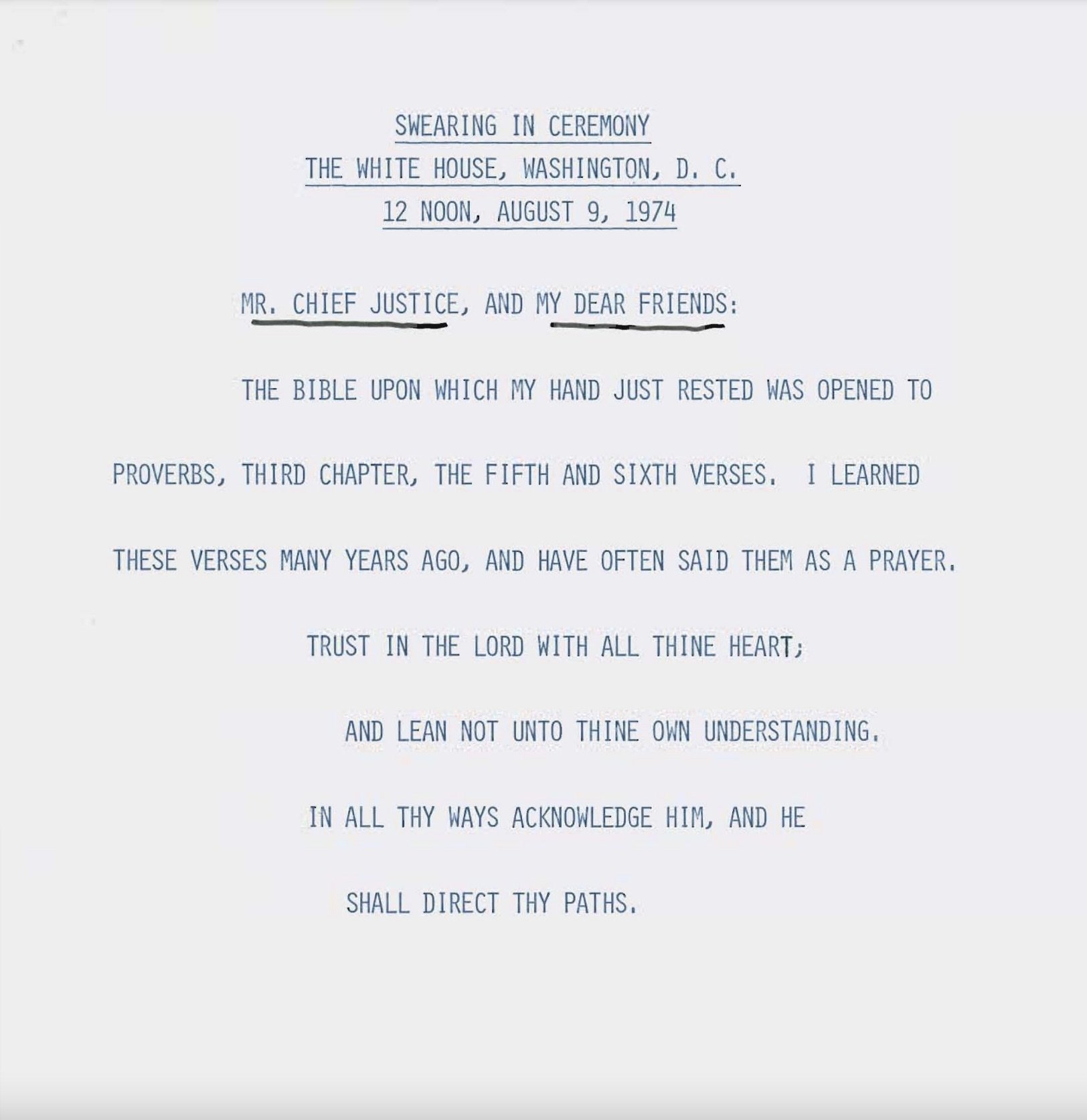Gerald Ford: The Indispensable Statesman for a Fractured Nation
This Friday, August 9, marks the 50th anniversary of Gerald Ford's swearing-in as the 38th President of the United States. His ascension to the presidency in 1974 came at a time when the nation was reeling from the resignation of Richard Nixon, who was embroiled in the Watergate scandal and threatened with impeachment. Ford’s legacy as a healer and a unifier is perhaps more relevant today than ever before. As we commemorate this significant milestone, it is worth reflecting on why Gerald Ford was the right man to heal the nation in 1974 and how his example can serve as a beacon for navigating our hyperpolarized political landscape in 2024.
Gerald Ford strode into the Oval Office with a mission: to bind America’s wounds and to restore trust in what had become an untrustworthy presidency. In a time of ethical relativism and political cynicism, Ford’s personal integrity stood out. Drawing on his service in the Navy during World War II, he embodied “integrity at the helm," guiding the ship of state with an unwavering commitment to ethical conduct, sound policy, and fiscal discipline. His presidency was characterized by transparency and accountability, with frequent news conferences to rebuild trust with the media and the American people. His candor was a breath of fresh air, contrasting sharply with the secretive nature of the previous administration.
Ford’s decision to pardon Nixon just one month into his administration was controversial, but it was a bold move aimed at national healing. He understood that dragging the country through a prolonged trial would only deepen the wounds of Watergate. Similarly, his offer of clemency to Vietnam draft dodgers was another step toward reconciliation, aiming to mend the fractures caused by a contentious war that had become unwinnable. These acts, while controversial at the time, were later redeemed when it was realized the degree to which Ford put the good of the nation above partisan advantage and personal ambition.
A Republican by party affiliation, Ford brought unifying skills to the White House. His many years in a Democratic-led Congress taught him the value of principled bipartisanship. He recognized that effective governance required reaching across the aisle to pass critically important legislation. In today’s poisoned political environment, recalling Ford’s ability to navigate a divided Congress for the sake of his country is a testament to the power of moderation and cooperation.
Economically, Ford faced significant challenges, including rampant inflation and high unemployment. His approach to stabilizing the economy involved vetoing federal spending bills the country could not afford, deregulating struggling industries like banking, and promoting tax cuts to stimulate job growth. His energy independence policy laid the groundwork for future economic stability, addressing the energy crisis with foresight and pragmatism. Ford’s economic policies were aimed at creating a sustainable foundation for growth, demonstrating his commitment to the long-term prosperity of the nation.
On the foreign policy front, Ford’s tenure was marked by significant achievements. He believed in a strong America on the world stage—Michigan Senator Arthur Vandenberg had been his mentor, after all—and telegraphed “peace through strength” by steadfastly supporting our military. He also had estimable diplomatic victories. The Helsinki Accords, which he secured with the Soviet Union, provided a framework for human rights within the Eastern Bloc, giving dissidents a platform to criticize their regimes and ultimately weakening Soviet control; Presidents Reagan and Bush would have Ford to thank for this major victory in the Cold War. Ford’s negotiations with Israel and Egypt further solidified his legacy as a statesman who prioritized international stability; President Carter would have Ford to thank for helping make the Camp David Accords possible. His handling of the Vietnam War’s aftermath, particularly through humanitarian efforts like Operation Babylift, showcased his decency and commitment to a redemptive peace.
The celebration of America’s Bicentennial in 1976 proved to be a pivotal moment for the Ford family. He and First Lady Betty Ford used the year-long celebrations to help our battered nation get out of the shadows of Watergate, Vietnam, and mounting cynicism. It was important to remind Americans of their great heritage and can-do attitude. Reacquainting citizens with the Spirit of ‘76, the Fords believed, could inspire a renewal of national pride and purpose. Their vision for America always focused on our shared destiny. They were constantly seeking ways to encourage the better angels of our nature to form a more perfect union.
Gerald Ford understood the stakes of America’s success or failure at a time of constitutional crisis, economic hardship, and declining morale. Whatever he expected of Americans, he demanded much more of himself. It started with personal virtue and extended to civic purpose. He recognized that in a diverse society, the ability to disagree without being disagreeable was paramount. Not all disagreements in policy were disagreements in principle, and not all disagreements in principle were disagreements in purpose.
As we reflect on Gerald Ford’s legacy, we have come to see that his leadership is just as relevant nowadays as it was in the 1970s—perhaps more so. In a time of deep division and cultivated distrust, we can draw inspiration from his example to guide us toward a better future. Ford’s presidency was a testament to the power of unimpeachable integrity, principled bipartisanship, and visionary leadership. By honoring his memory, we can go far to heal our fractured society today.
Questions:
1. Which of Ford’s policies and principles do you think are most applicable to today’s political climate?
2. What can leaders today do in the spirit of President Ford to make our nation better and more united?
3. Do you think a man of principle and virtue like Gerald Ford could be elected to national office today?






